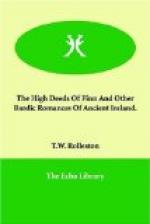[28] The Instructions of Cormac
(Tecosa Cormaic) have been
edited with a translation by Dr.
Kuno Meyer in the Todd Lecture
Series of the Royal Irish Academy,
vol. xv., April 1909.
“Let him (the king) restrain the
great,
Let him exalt the good,
Let him establish peace,
Let him plant law,
Let him protect the just,
Let him bind the unjust,
Let his warriors be many and his
counsellors few,
Let him shine in company and be
the sun of the mead-hall,
Let him punish with a full fine
wrong done knowingly,
and with a half-fine wrong
done in ignorance.”
Cairbry said, “What are good customs for a tribe to pursue?” “They are as follows,” replied Cormac:—
“To have frequent assemblies,
To be ever enquiring, to question
the wise men,
To keep order in assemblies,
To follow ancient lore,
Not to crush the miserable,
To keep faith in treaties,
To consolidate kinship,
Fighting-men not to be arrogant,
To keep contracts faithfully,
To guard the frontiers against
every ill.”
“Tell me, O Cormac,” said Cairbry, “what are good customs for the giver of a feast?” and Cormac said:—
“To have lighted lamps,
To be active in entertaining the
company,
To be liberal in dispensing ale,
To tell stories briefly,
To be of joyous countenance,
To keep silence during recitals.”
“Tell me, O Cormac,” said his son once, “what were thy habits when thou wert a lad?” And Cormac said:—
“I was a listener in woods,
I was a gazer at stars,
I pried into no man’s
secrets,
I was mild in the hall,
I was fierce in the fray,
I was not given to making
promises,
I reverenced the aged,
I spoke ill of no man in his
absence,
I was fonder of giving than
of asking.”
“If you listen to my teaching,” said Cormac:—
“Do not deride any old person though
you be young
Nor any poor man though you be rich,
Nor any naked though you be well-clad,
Nor any lame though you be swift,
Nor any blind though you be keen-sighted,
Nor any invalid though you be robust,
Nor any dull though you be clever,
Nor any fool though you be wise.
“Yet be not slothful, nor fierce, nor sleepy, nor niggardly, nor feckless nor envious, for all these are hateful before God and men.
“Do not join in blasphemy, nor be the butt of an assembly; be not moody in an alehouse, and never forget a tryst.”
“What are the most lasting things on earth?” asked Cairbry.
“Not hard to tell,” said Cormac; “they are grass, copper, and a yew-tree.”
“If you will listen to me,” said Cormac, “this is my instruction for the management of your household and your realm:—




